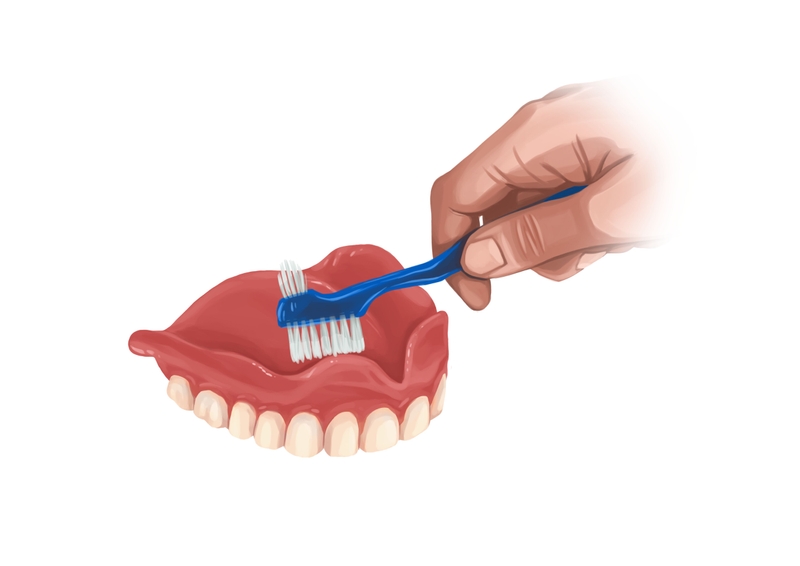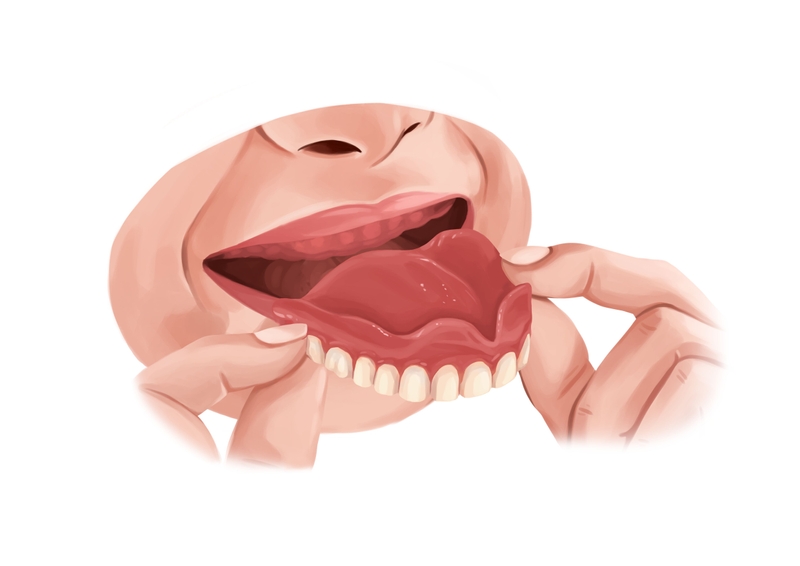- Maintaining denture hygiene is critical to oral health. It also prolongs the life of your dentures.
- Common problems associated with poor denture hygiene include fungal infections, stomatitis, mouth sores, and halitosis.
- Treatment of mouth sores and fungal infections may require a visit to the dentist.
Use Authority Dental to find an affordable denture dentist near you, or sign up for a dental discount plan and save up to 60% on all dental procedures, including dentures.
For at-home maintenance, ultrasonic denture cleaners are another convenient option to keep dentures fresh and reduce the risk of oral infections.
Why is it so important to keep your dentures clean? Here's everything you need to know.
Best way to clean dentures

Picture by Authority Dental under CC 2.0 license
We said cleaning your dentures is easy, but there is still a right and a wrong way to do it. It may not seem like it matters, but failing to follow instructions can cause your denture to deteriorate more quickly and possibly even break.
Dentures require a financial investment from patients, especially if manufactured by one of the best dental labs. Thus, to protect your investment, not to mention your oral health, you must take some time to care for them. There are several steps you can follow to ensure you take great care of your dentures.
Prepare cleaning area
Preparing a cleaning area is the first step. Ensure you have all the necessary items to clean your dentures before beginning. This might include a denture brush, cleaning products, a cup of water, and a towel.
You should always clean your dentures over a soft surface (like a towel) or a sink with water. The reason for this is to prevent your dentures from breaking if you drop them during cleaning.
Take out dentures
The first few times you remove your dentures seem difficult, especially if you have an upper denture with excellent suction in the palate area. If you use denture adhesive, that will also make them harder to remove.
Use a finger to hook around the ridge portion and gently pull up or down. Place your finger as far back as possible when trying to remove the denture. You may need to alternate from side to side until they come loose. Over time, you will find the best way to remove your dentures and be able to get them in and out very quickly.
Remove plaque and food debris
If you use denture adhesives, remove any remaining adhesive from both the dentures and your gum tissue. You can usually peel the adhesive from the denture instead of having to brush it off. Using a brush is effective, but the adhesive can get stuck in the bristles, resulting in a second mess to clean.
Do the same for any adhesive that is left on your gum tissue. Remove the adhesive with your fingers and then use a mouth rinse if desired.
After removing your dentures, gently remove all loose food particles and dental plaque. Use a soft denture brush and warm water, and gently scrub your dentures. You can also use a solution of either baking soda or salt, which will help clean the dentures while brushing. Additionally, there are numerous over-the-counter products available to aid in removing plaque and stains from dentures.
"Do not think of your denture as a set of teeth; think of it as a pair of eyeglasses. You would never scrub your eyeglass lenses with a gritty paste, right? You would scratch them to pieces. Your denture is made of a finely polished acrylic, not super-hard enamel," Lee warns.
If you have implant-retained dentures, you will also need to spend some time cleaning your dental implants. A soft-bristled toothbrush and water are best for gently cleaning around each implant. Without proper care, implants can become infected, which could lead to the loss of the entire implant.
Soak overnight in denture solution
Anytime you are not wearing your dentures, they should be placed in a glass of water. Plain water is acceptable, but you can also use a denture cleanser overnight. Denture cleaning tablets dissolve in water, helping to remove stains, plaque, and harmful bacteria.
Leaving your denture out of your mouth and out of water for extended periods can cause it to dry out. It can start to shrink and warp, and will no longer fit. There is no way to repair a denture after this happens; you must have a new one made.
Visit a dentist for professional cleaning
You may think you do not need to see a dental professional if you have complete dentures, but that is not the case. You should visit your dentist at least once per year so they can check the fit of your dentures and the health of your gums. Dentists also do oral cancer exams, so even though you might not have any natural teeth, dental visits are still important.
In addition, your dentist will perform a professional denture cleaning. They use powerful ultrasonic machines that vibrate to remove the plaque buildup from your appliances. They can use this on both complete dentures and partial dentures.
Consequences of not cleaning your dentures

Picture by Authority Dental under CC 2.0 license
If you do not clean your dentures properly, it will not take long to notice the negative consequences. Additionally, you will likely need to visit your dentist to resolve the issue.
Fungal infection
Improper home care can cause a fungal infection in your mouth. It is also referred to as candida or thrush. When it appears in the mouth, it is called denture stomatitis. We all have a form of Candida present in our mouths. Poor home care allows Candida to accumulate to higher levels, eventually leading to thrush.
If you have denture stomatitis, you will notice a red area under the denture. You may also see redness in the corners of your lips. Fungal infections can cause bad breath, also known as halitosis. With better care, the fungal infection usually resolves on its own. However, your dentist may prescribe a medication to quicken the healing process.

Mouth sores
If left untreated, fungal infections can turn into mouth ulcers or sores. These are painful, and you will need to see your dentist to determine if a denture adjustment is needed while the areas heal. Most often, though, a mouth sore will go away as soon as the denture is cleaned and the areas have had time to heal.
FAQ
What to avoid while cleaning dentures?
When cleaning your denture, avoid using a hard-bristle brush or any abrasive substances. Both of these could scratch the dentures. You should also avoid whitening materials and household cleaners. Lastly, avoid using hot water, as it may melt the acrylic.
How often should you soak dentures?
You should soak your dentures in clean water anytime you are not wearing them. Most people place them in water overnight when sleeping. Leaving dentures out for too long can cause them to warp and shrink, and they will no longer fit properly in your mouth.
Can you clean dentures with bleach?
You should never use bleach or any other household cleaning supplies to clean your dentures. Bleach contains harmful chemicals that could deteriorate your denture and burn your gum tissue if any is left on the dentures.
What are the best natural denture cleaners?
Baking soda and salt are both natural denture cleaners that can remove food particles and tartar from dentures. You can mix either one with warm water and either soak your dentures in the solution or use it to brush them. You should not use either one without diluting it with water, as they are abrasive and could scratch your appliance.
Harry Lee, DMD
One of the biggest challenges my denture patients face is unlearning a lifetime of habits. They naturally want to grab their regular toothbrush and toothpaste to clean their dentures, but that is one of the worst things they can do. I always try to give them a new way to think about it.